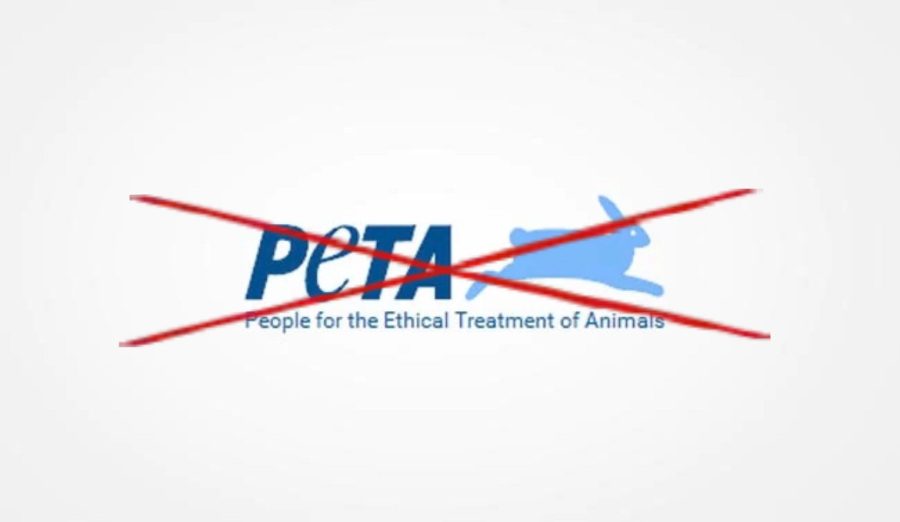PETA: Friend or Foe?
People for the Ethical Treatment of Animals Image (Photography by: Chloe Nguyen).
People for the Ethical Treatment of Animals (PETA) has been in the news for multiple years through its controversial protests, ads, and campaigns. PETA fights for the end of animal suffering, yet unexpectedly has been caught treating its animals carelessly.
PETA says they specifically focus on ending animal cruelty within clothing, food and entertainment industries, and animal labs. PETA actively advocates against “speciesism” which is discrimination on the basis of species. The organization argues the reason why animals are exploited so easily is due to the fact that humans grow up believing humans are more worthy than other animals.
At the beginning of its organization, PETA had some good acts and victories. PETA shelters are the first to rescue pets during hurricanes and heatwaves. Another PETA success occurred when the organization made animal crash tests illegal. Many makeups and skincare brands such as Urban Decay and NYX have also boycotted animal testing thanks to PETA’s influence.
Despite the fact that PETA protests against animal exploitation, the statistics show a different story. Specifically, one of their shelters in Norfolk, Virginia on average kills approximately two thousand animals per year. In 2011, their shelter euthanized 713 of their 760 dogs, only allowing 19 to be adopted, while 36 got moved. Out of the 1,211 impounded cats, 1,198 were killed, 5 adopted, and 8 transferred to other shelters. They also sheltered 58 rabbits, later killing 54 of them. All in all, these numbers make their adoption rate 2.5% for dogs and .4% for cats.
After hearing these numbers, Ella Watkins, a junior at Huntington Beach High School said, “I am shocked. I had no idea that a group like PETA could be so hypocritical when all they fight for is animal rights.”
For the last three decades, PETA has openly campaigned against large corporations for their cruel treatment of animals. These include McDonald’s for their treatment of chickens, the Ringling Brothers regarding the use of show elephants, and General Motors due to their use of test crash pigs. PETA’s most widely known protest was the “I’d Rather Go Naked Than Wear Fur” movement where models would pose in ads nude with messages against fur products. These messages would say, “Be Comfortable in Your Own Skin and Let Animals Keep Theirs” or “Wear Your Own Fur!” These ads became so successful that celebrities joined the movement and ultimately PETA ended this campaign in 2020 because they felt they reached their audience.
Even though this campaign was successful in numerous big fashion houses, people have now begun protesting against them PETA regardless of their renowned name. Those who support no-kill shelters have been boycotting PETA and by doing so they are spreading different policies to other activists. Old supporters see PETA’s euthanization policy as inhumane and old-fashioned. In the past, the idea of a no-kill shelter was unimaginable, which was one of the reasons PETA had immense popularity. However, now that more organizations are stepping up, no-kill shelters actually exist now and PETA support is diminshing.
When asked about their stance on PETA, Kloey Silvia, a senior at Huntington Beach High School said, “I am an active animal rights activist, but I could never support PETA. I have seen their tactics and I do not agree with how they run their organization. I feel like if PETA tried using less out-of-the-ordinary and out-there campaigns, it would be easier to take them seriously. To simply put it, if PETA changed its strategies, maybe I would consider supporting them.”
If you want to protest against animal cruelty, the easiest option is to donate to organizations that stick true to their policies. Be mindful of who you are supporting and do your research before donating. Their intentions may seem good but underneath the surface, they could be hiding something more gruesome. Organizations like Maddie’s Fund are a good start. Another option is to adopt an animal. By doing so, shelters won’t be overcrowded and will thus result in more no-kill shelters.
One of the biggest organizations against PETA, Maddie’s Fund, has successfully helped make shelters become no-kill. Maddie’s Fund has granted over $255 million to the animal rights industry in order to fund fosters, promote animal medicine education, and raise awareness. They have given a voice to this industry on a national level, showing people that “unsavable” animals are able to be homed also. By donating supplies and food, they have committed to helping keep families and their pets together, preventing more animals from being given up.
If you are interested in donating here are some good organizations:
Your donation will support the student journalists of Huntington Beach High School. Your contribution will allow us to cover our annual website hosting costs.
Thank you for supporting our program!







